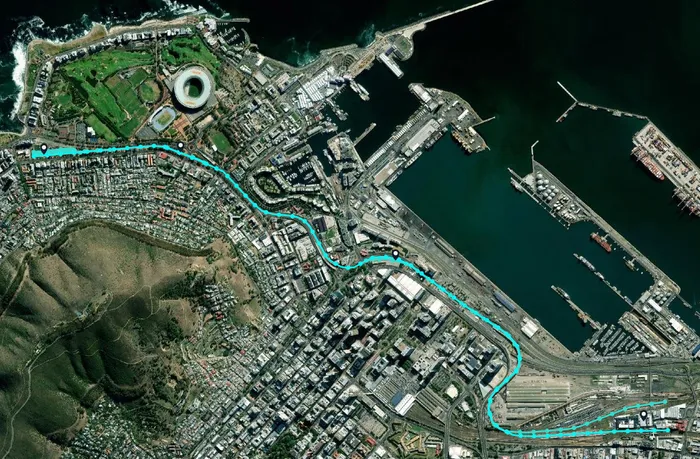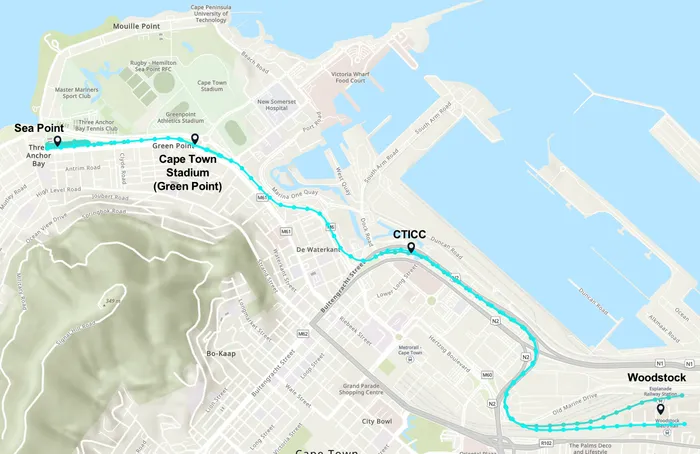Cape Town's unfinished freeway: A new vision for an elevated train line

A proposed 6km train line in Cape Town aims to connect key areas like the City Centre and the Waterfront with the Foreshore's unfinished freeway, but faces economic feasibility challenges according to city officials.
Image: Gareth Ramsay, Development Engineer
The City said a proposed 6km train line which would connect key areas like the City Centre and the Waterfront in under 10 minutes and integrate with the existing PRASA network and utilise the Foreshore’s 40-year historical unfinished freeway, would not be feasible economically. However, local engineer Gareth Ramsay is confident that it would work, allowing PRASA to rent the land and foot the cost of operations.
In February this year, Development Engineer Gareth Ramsay made a proposal to the City’s Urban Mobility focusing on the development of Cape Town’s unfinished freeway and Three Anchor Bay site.
A copy of the 31-page proposal, including imagery and maps, was shared with Cape Argus by Ramsay, who said a public participation process was vital and asked residents to submit their views: www.infinity.capetown/3anchorbay/engagement.
Ramsay proposes constructing an elevated train line from Woodstock to Sea Point, incorporating a terminus at the Three Anchor Bay site instead of solely developing it for mixed-use. He said the rail line aims to reduce car dependency, encourage public transport, and ease traffic congestion while also providing better access to the city.
In his proposal, Ramsay details that the train line would enhance accessibility to key areas such as the city, Sea Point, Green Point, the Waterfront, and the Cape Town Stadium for all residents, and would solve the issue of the incomplete freeway which has been standing dormant for decades. Earlier, the City cited a solution for the bridge, which remained a priority in their budget.
Former Transport Minister Fikile Mbalula estimated completion would cost R1.8 billion (in 2003 prices) and could be finished by 2030/31. The bridge's design started in the 1960s, and construction halted in 1977 due to budget issues. A 2018 Request for Proposals was later cancelled due to legal advice. Today, the bridge is a haven for the homeless and has been the site for past movie or advertisement productions.
“By improving mobility, it would help address historical inequalities, offering a cost-effective transport option that facilitates access to opportunities and popular destinations,” Ramsay said via the proposal. “It also provides an alternative to the completion of the foreshore freeways, which would essentially make use of the city’s most valuable piece of available land for vehicular use, contradicting the city’s aim of reducing congestion within the city and making it more pedestrian-friendly.”
The approximately 6km line will enable travel from Woodstock Station to Sea Point in under 10 minutes, including station stops, with an average train speed of 60-70 km/h. This will offer safe, efficient, and affordable access to key areas such as the Foreshore, Waterfront, Green Point, and Sea Point for all city residents. Councillor Rob Quintas, the City’s Mayoral Committee Member for Urban Mobility, told Cape Argus that implementing an elevated rail line was not a consideration and that they were focused on their MyCiTi project.
The Urban Mobility Directorate’s proposed capital budget over the medium term, starting on 1 July 2025 until 30 June 2028, amounts to over R7.9 billion, with key priorities: R5.4 billion for the roll-out of the MyCiTi bus service to connect Mitchell’s Plain and Khayelitsha with Wynberg and Claremont. “The City has already invested in a road-based public transport system servicing the CBD and Atlantic seaboard in the form of the MyCiTi bus service. Investment in improving existing services is more practical and cost-effective,” said Quintas.

Proposed elevated train line connecting Cape Town's City Centre to the Waterfront, utilising the city's unfinished freeway to enhance public transport and reduce car dependency.
Image: Gareth Ramsay, Development Engineer
Quintas added that to maintain an elevated freeway train line would be costly due to limited budgets. “A modern elevated rail system requires significant investment in infrastructure, rolling stock, and operations,” he said.
“Given the City’s budget limitations and the need to prioritise cost-effective solutions, funding such a project is not viable. International experience also shows that these rail systems require ongoing subsidies to remain operational. Integrating it with other modes of transport will also be extremely costly due to the infrastructure modifications it would require.
Ramsay said in December 2024, the City approved a public participation process for the release of city-owned land in Three Anchor Bay for mixed-use development which would include the opportunity to integrate the unfinished freeway for development. He explained the train line would integrate into PRASA’s rail network and would be compatible with the existing rolling stock, namely PRASA’s new blue X’Trapolis Mega EMU, better known as Iisitimela Sabantu. The proposal further suggests that the Three Anchor Bay site could accommodate a train terminus above and around it, including commercial, retail, office, and residential spaces and that this could generate R700 million in capital.
The Cape Argus has since reached out to PRASA, and they indicated they were formulating a response. Western Cape Minister of Infrastructure, Tertuis Simmers’ office said they could not comment on the proposal or what the future plans were for the freeway as it was a project in the domain of the City.
Ramsay also stated the train line would allow for easier access to the Cape Town Stadium where a station would accommodate everyone, including international guests and those taking part in sports events.
Ramsay argued that previous estimates to complete the foreshore freeways put the cost to over R2.1 billion for just 3km of the elevated freeway. He suggested that PRASA would carry the cost of operating the line, which would include staffing and maintenance, and that they would pay the City a rental fee for use of the land.
Cape Argus
